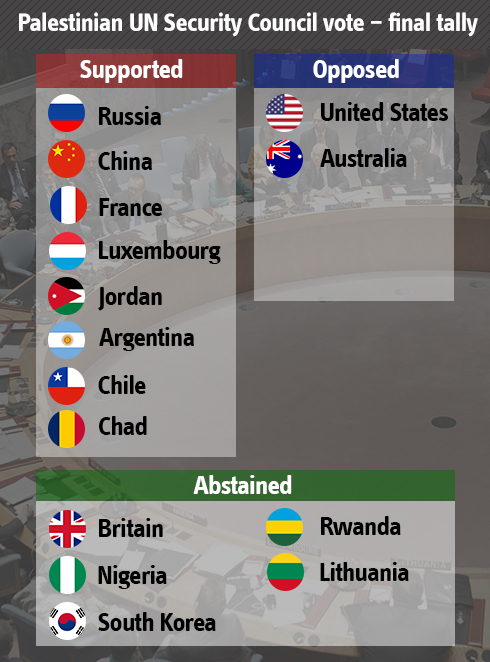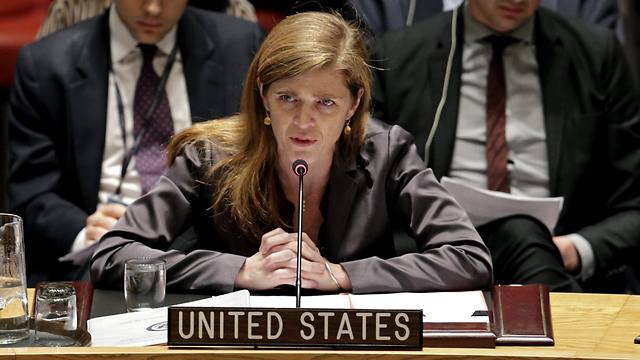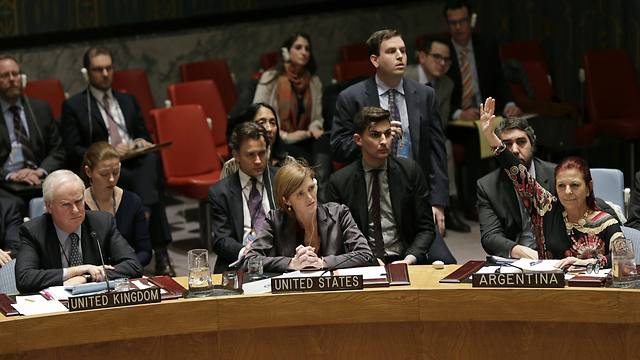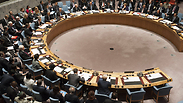
Behind the UN vote: How the Palestinian bid was defeated
Analysis: How US helped lead blitz to torpedo unilateral Palestinian resolution in UN Security Council, and how a phone call helped Nigeria's surprising change of heart. 'There was a clear message from international community to the Palestinians: Do not try to use tricks to replace negotiations,' official says
"There was a clear message from international community to the Palestinians: Do not try to use tricks to replace negotiations," a top Foreign Ministry official told Ynet, but the American effort to torpedo the Palestinian's UN Security Council resolution demanding Israel end its 'occupation' of the West Bank proved once again the importance of maintaining good relations with Washington.
Furthermore, the abstention by African nations also demonstrated the importance of the visits made by Foreign Minister Avigdor Lieberman to the African continent. However, the change of power set to take place in the Security Council on Thursday will change the balance of power against Israel.
The rejection of the Palestinian resolution by the UN Security Council on Tuesday night was a reminder of the great extent to which Israel-US relations serve as a critical factor in Israeli national security. It only strengthens the need for Israel to maintain good relations with Washington in general and more specifically with the White House, and prevent disagreements such as the one that occurred between Defense Minister Moshe Ya'alon and US Secretary of State John Kerry.
Israeli diplomats say that the US played a crucial role in the effort to block the Palestinian resolution which sought to set a time table for Israel's disengagement from territories for a future Palestinian state without direct negotiations.
"The US had a very significant role," said a high-ranking official at the Foreign Ministry in Jerusalem. "Not only were they willing to veto, they also worked side-by-side with Israeli diplomats in order to prevent support for the decision within the Security Council. It's not that they just said they would vote against it. They worked. There were phone calls and messages. The American diplomatic effort is noteworthy."
Apart from the critical help from Washington, the results of the Security Council vote are also a testament of the diplomatic achievements made by the Foreign Ministry headed by Avigdor Lieberman, who marked Africa as a target for diplomatic efforts. The African nations proved themselves loyal during the moment of truth with the support of Rwanda and Nigeria.
Representing the Netanyahu government, Lieberman set out on a trip that began in September of 2009 in which he visited Ethiopia, Kenya, Ghana, Nigeria and Uganda. In June 2014, Lieberman returned to Africa and visited Rwanda, the Ivory Coast, Ghana, Ethiopia, and Kenya.
Visits of by an Israeli diplomat of this stature to Africa have not been seen since the days of Golda Meir as foreign minister. During her tenure, Israel had 27 representatives in Africa compared to the 10 that exist today. The wide-ranging investments Israel has made in African aid, along with the Israeli business that operate in the continent, proved to be very worthwhile.
Nigeria's pivotal change
They key nation was without a doubt Nigeria.
The African nation was the ninth country that was supposed to give the Palestinians the necessary majority in the UN Security Council. In the end, it became the nation that swayed from Palestinian support to abstention and by doing so enabled the prevention of the unilateral Palestinian resolution to pass.
High-ranking officials within the Foreign Ministry had already come to terms with the fact that Nigeria would give Palestinian the ninth vote majority and that the US would then use its veto. But the events played out surprisingly different.
"We discovered that the Nigerians did not submit and did not break down and voted according to their conscience," explained a high-ranking source at the Foreign Ministry. What finally tipped the balance was a phone call made by Netanyahu to the President of Nigeria Goodluck Jonathan, he claimed.
Jonathan is a good friend to Israel. In the last year, he visited Israel twice – the most recent visit occurred two months ago when Jonathan arrived in Israel on his private plane in order to lead mass for 3,000 Nigerian pilgrims in Jerusalem and place a not at the Western Wall in Jerusalem.
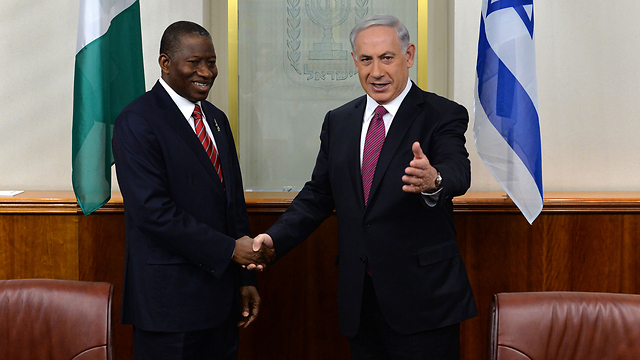
Jonathan met with Netanyahu and the two discussed a variety of subjects, including Nigeria's way of voting in the UN Security Council. Israel attached great importance to the visit, specifically because of a situation like that which occurred on Tuesday night. It was clear that Nigeria would be a pivotal country if the Palestinians were to gain the necessary majority.
It should be noted that up until recently, Nigeria had the habit of automatically voting with the Palestinians – marking a historical change in the country's voting patterns.
Part of the change stemmed from the tightening relationship between Israel and Nigeria and from the common interests of the countries in the fight against global terrorism. Israel was one of the first nations in the world to offer the Nigerians help in the struggle against the Boko Haram terrorist group.
According to various reports, Israel also sold the Nigerians weaponry to be used in the struggle, while the US had enacted an arms embargo against Nigeria.
Every year, 30,000 Nigerians make their way to Israel. During Jonathan's last visit to Israel, Israel launched an airline agreement with Nigeria that will introduce direct flight between the two countries. Israel not only cooperates with Nigeria in the war on terror but also in the fields of agriculture, construction, communication, intelligence and more. More than 50 Israeli companies operate in Nigeria in the civil engineering, energy, communication, and security industries among others.
Other than Nigeria, Rwanda was also a key African country that helped the Israeli effort to prevent the Palestinian resolution from passing in the UN – although their vote came as no surprise. Israel has very good relations with Rwanda, especially between Lieberman and Rwanda's foreign minister and between Netanyahu and the Rwandan president. Israel and Rwanda have several business relations and the foreign ministry invests in aid to Rwanda in several different categories. Another country that proved itself a loyal ally to Israel was Lithuania – which also abstained from voting.
Officials from the Foreign Ministry said: "We marked Africa as a target continent for our diplomatic efforts, but we have to say that there are regional and global circumstances that change the principles by which the diplomats function. One of the most important things today is the struggle against radicalism and terror.
A change for the worse: Venezuela and Malaysia to enter Security Council
The question that arises after the Palestinian failure at the UN Security Council is why the Palestinian Authority did not wait until January 1st to vote on their resolution. On Thursday, the countries that form the Security Council will be changed – friends of Israel Australia and Rwanda will be replaced with Venezuela and Malaysia, who are not the biggest fans of Israel to say the least.
In Israel, there is a disagreement between the various agencies as to why the Palestinians demanded to hold the vote before the change of countries within the Security Council.
One position held by sources at the foreign ministry offers the idea that the Palestinians wanted to lose in order to prevent the US from using its veto power, which would endanger a breakdown with the Palestinian Authority's relationship with Washington or even worse – lead to elimination of foreign aid from the US, a real threat after pressure instilled on Palestinian President Mahmoud Abbas by Secretary Kerry by way of the American Ambassador to the UN Samantha Powers.
On the other hand, the Prime Minister's Office says that the Palestinians did yearn to win the vote in the UN – the proof being that they managed an aggressive campaign and were even close to gaining a majority before Nigeria suddenly switched its mind.
A high-ranking official at the foreign ministry who was involved in the diplomatic efforts to block the Palestinian proposal said that the lesson learned from the failure of the Palestinians to pass the resolutions is that there is a new reality in the region with a new set of priorities.
"There was a clear message from the international community to the Palestinians: Do not try to use forceful trick in the UN to replace results of negotiations with Israel," said the foreign ministry official.
"Everyone said it at the Security Council – the way to solve the disagreements between Israel and the Palestinians is through negotiations and not through votes at the Security Council. Even those who voted in favor said this," the foreign ministry official continued.
Foreign Minister Lieberman said after the vote: "The failure of the proposal must teach the Palestinians that the provocations and attempts to force Israel into unilateral moves will not lead them to any gains – only the opposite. The Palestinian disregard of the most important countries in the international community, with the US in front, is due to the tail wind they have received from some European countries. Thus, any country that wants to promote an agreement must act responsibly and make clear to the Palestinians that decisions are only made around the negotiating table."










